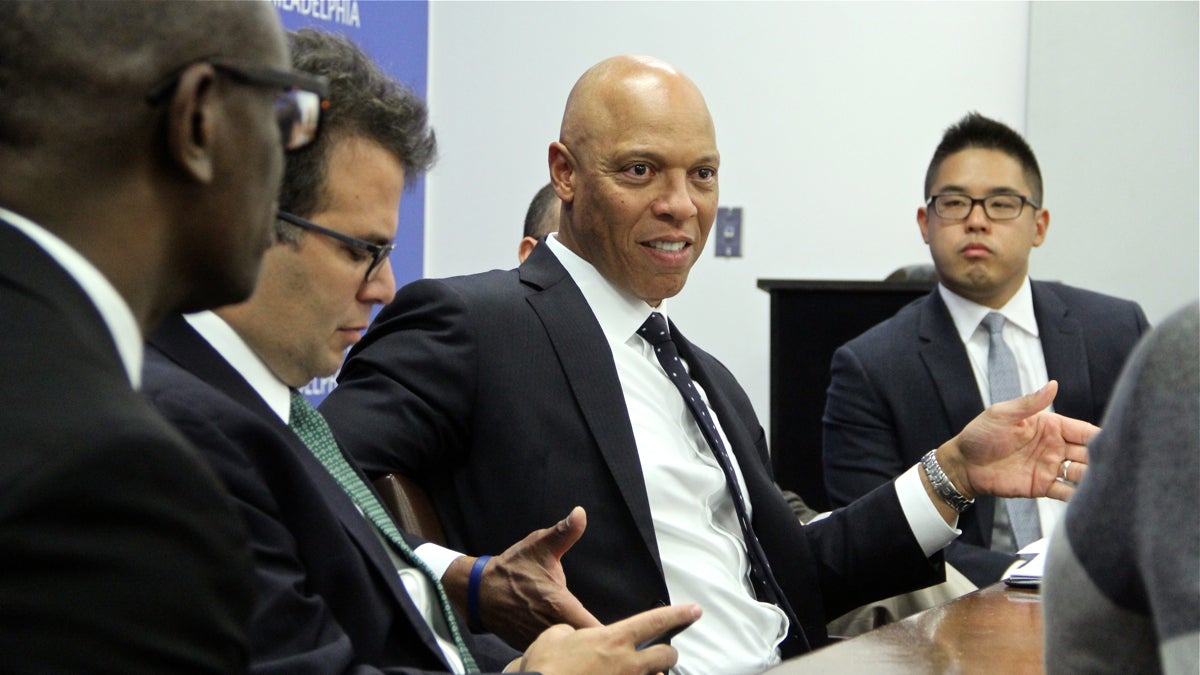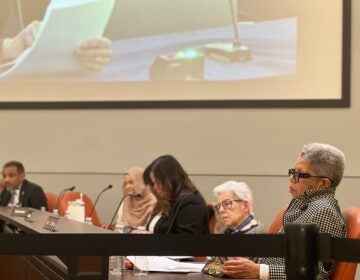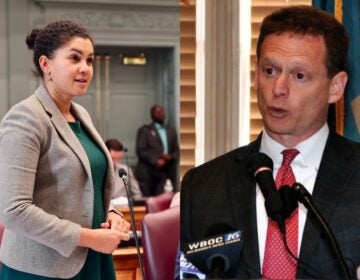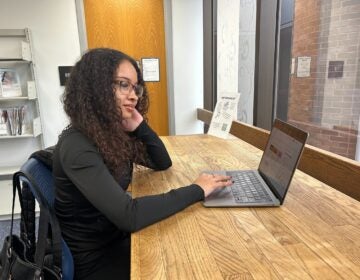Philly schools will open on time, but with fewer resources than last year

Philadelphia Schools Superintendent William Hite. (Emma Lee/WHYY)
Philadelphia’s public schools will open on time and – for the time being – mass layoffs will be averted.
Superintendent William Hite made the announcement Friday morning after a month where he offered both options as a way to cover the district’s $81 million budget gap.
The district is banking on the assurance of top republican lawmakers in Harrisburg that Pennsylvania will pass legislation authorizing the $2-per-pack Philadelphia cigarette tax in mid-September.
If so, the district expects revenue collections will begin Oct. 1 and generate $49 million for the district this school year.
This, of course, is no slam dunk. The House and Senate haven’t been able to find consensus on the measure since City Council endorsed it in early 2013, but House Majority Leader Mike Turzai came to Philadelphia this week to assure Hite that it will pass this fall.
Although Hite says there’s reason to doubt passage, he’s willing to count on that funding to open schools on time.
In order to close the remaining $32 million gap, the district will count on an assortment of “hopes” and “cuts.”
Flanked by four members of the School Reform Commission at a press conference in the atrium of the district’s North Broad Street headquarters, Hite explained the district’s rationale.
“For the sake of minimizing disruptions for families, and for the sake of educating children, we’ve made the decision to make a series of additional difficult and, hopefully, temporary cuts in order to open schools on time,” he said.
The cuts:
High school students who live within 2 miles of school will not receive transportation, meaning 7,500 fewer students at district, charter and nonpublic schools will be bused.
Reductions to funding for the multiple pathways to graduation program, which the district said will affect 300 students.
Elimination of preparation and professional development time for teachers at the district’s promise academies.
Schools will be cleaned less frequently and have access to fewer cleaning supplies.
School police officer vacancies will be left unfilled, leaving an additional 27 elementary schools to share an officer. High schools would be unaffected.
Cuts to additional central office departmental positions, resulting in 20 layoffs.
The hopes:
Lower prices can be negotiated with some of the district’s vendors.
Sales will close on more of the district’s unused properties.
The state Department of Education will stop making payments to charters for students enrolled above and beyond agreed-to caps.
Hite, who believes schools will be safe despite the cuts, said this plan makes sense academically for students and fiscally for the district.
Delaying the school opening, he said, “potentially could further exacerbate our deficit if, for example, additional students exited our schools for charter schools.”
A district spokesman confirmed that the idea of shortening the school year is now off the table.
Beyond academic concerns, Hite said shortening the year would be troublesome because many salaries and contracts still would need to be paid, and the state would deduct its subsidy for days missed.
Imploring teachers union for concessions
Hite said he hopes the cuts can be restored by October by getting the Philadelphia Federation of Teachers union to agree to a concessionary contract.
“We implore…the PFT to make concessions in line with those already made by principals, blue-collar workers, and non-represented staff,” he said.
The district will no longer seek across-the-board wage reductions from teachers. It had been asking for salary cuts between 5 and 13 percent.
Without cigarette tax revenue and PFT concessions, Hite said the district would be forced in mid-October to cut school budgets. If that happened, more than 1,000 school staffers would be laid off.
“The only way out of this vicious cycle is to receive stable, recurring revenues – including through a full, fair funding formula – and for our labor unions to contribute to a shared solution,” said SRC Chairman Bill Green.
“If they don’t, the SRC will need to exercise its powers and act,” he said. “That is not a threat, just a statement of fact. We will be forced to act.”
In an official statement Gov. Tom Corbett joined Green in urging the PFT to make concessions.
“Now, more than ever, it is incumbent upon the paid union leadership of the Philadelphia Federation of Teachers to join all of us in these efforts to finally fix the financial crisis confronting the Philadelphia School District,” said Corbett. “The students deserve no less than everyone’s full focus.”
Union headquarters
At a press conference at PFT headquarters, union president Jerry Jordan said he last year offered to “make adjustments to our benefits package” that totaled “tens of millions of dollars.” He said members also offered to forgo a wage increase.
“These concessions alone would have closed the budget deficit if the district had accepted our proposal last August,” he said.
Jordan, who refused to offer specifics, said this offer remained on the table.
At district headquarters earlier in the day, Hite said Jordan’s pitch wasn’t sufficient.
“What we need is substantially more than what is currently being discussed.”
Hite would not provide a specific dollar amount, but said the teachers should make sacrifices comparable to the district’s other labor partners – roughly a 10 percent concession.
In addition to health care concessions, the district still seeks to reach agreement with the PFT around its desired work rule changes. These include ending the practice of using seniority as the sole factor in layoff decisions.
Asked if he’d be willing to watch more layoffs occur in order to stand strong on health care and work-rule offers, Jordan bristled with frustration.
“Had the district taken our offer last year, we wouldn’t be here talking about that amount of money,” he said, “because that amount of money was put on the table.”
Jordan emphasized that teachers have compensated for some of the district’s resource deficiencies.
“Our city’s educators are the reason our classrooms are stocked with papers, pens, erasers and other essential supplies,” he said.
Although the district is no longer asking for across-the-board salary concessions, Jordan says it is still seeking PFT furlough days, which “amounts to a pay cut.”
In July, the district laid off 300 non-teaching assistants.
The PFT contract expired at the end of August 2013. Jordan said negotiations have not occurred “for weeks,” but expected they’d resume again soon.
Kristin Luebbert, a teacher at Bache-Martin elementary school and founding member of the Caucus of Working Educators, said colleagues were open to health care compromises.
“Teachers and school staff and nurses and counselors are willing to be reasonable about health benefits,” she said. “But you have to sit down and see what that looks like in your paycheck. For everyone, it’s different … I think people are willing to hear a proposal.”
‘Little comfort’
In an official statement, Council President Darrell Clarke said Friday’s announcement offered “little comfort,” adding he was “especially concerned about cuts to safety personnel and services.”
Helen Gym, founder of Parents United for Public Education, dismissed the view that schools would be safe this year.
“Schools weren’t safe last year,” she said. “I think ‘safety’ is an awful bar for schools … we’re sending our children to go to a learning institution, we’re not sending our children to be warehoused for six hours.”
Parent George Matysik, co-chair of the Friends of Mifflin School in East Falls, questioned the actions of the governor and state lawmakers.
“Is this a plan?” he said. “What’s the end game here? Because instead of giving us hope for tomorrow, Harrisburg is giving us hollow schools.”
The district, which enrolled roughly 135,000 students last year, expects its population to decline to roughly 130,000 students this year.
Outside of the press conference, a group of students from Youth United for Change lamented the reality that schools would open with even fewer resources than last year.
“We shouldn’t have to stand here fighting for our education. Our education is a right,” said Annisa Washington, rising sophomore at Constitution High School. “They need to do right with our funding, because we’re not having enough resources.”
A coalition of advocacy groups – including the Education Law Center, Education Voters of Pennsylvania, Pennsylvania Budget and Policy Center, Philadelphia Education Fund, Public Citizens for Children and Youth and Public Interest Law Center of Philadelphia – applauded the district’s decision to open schools on time, but criticized state lawmakers for failing to resolve the district’s funding crisis earlier.
“The legislature’s delay in approving the cigarette-tax authorization has been costly and we call on the General Assembly to authorize a supplemental appropriation to ensure that the $81 million that the district has requested is made available this year,” said Sharon Ward, executive director of the Pennsylvania Budget and Policy Center.
The labor-friendly advocacy group PCAPS blamed the district’s dire financial circumstances on Corbett and called for additional funding to be generated by enacting a 5 percent tax on natural gas drilling, accepting the federal Medicaid expansion, freezing the phaseout of business taxes, and restoring the state charter reimbursement budget line.
“The governor and Republican-controlled legislature need to take responsibility for funding education in Pennsylvania now rather than wait for the budget to blow up later in the year,” said PCAPS spokesman Jesse Kudler in an official release.
This budget season began with a $216 million gap just to get district schools back to last year’s admittedly inadequate level of resources. The district has been asking for an additional $224 million in order to implement Hite’s vision for district growth.
Even if the cigarette tax is passed and the PFT agrees to health care concessions, the district’s finances will continue to be woeful. Fixed costs for pensions and charter payments will continue to grow, and one-time cash infusions from things such as building sales will disappear.
With these things in mind, Hite already sees the 2015-16 budget crisis looming.
“We’re going to begin a process for talking about next year’s budget almost immediately after these things are concluded,” he said.
Elizabeth Fiedler contributed to this report.
WHYY is your source for fact-based, in-depth journalism and information. As a nonprofit organization, we rely on financial support from readers like you. Please give today.





